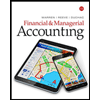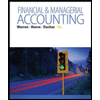
INTERMEDIATE ACCOUNTING ACCESS 540 DAY
10th Edition
ISBN: 9781264706327
Author: SPICELAND
Publisher: MCG
expand_more
expand_more
format_list_bulleted
Question
Chapter 1, Problem 1.14E
To determine
Financial Accounting Standards Board (FASB): FASB is an independent 7 member board, of accounting professionals overseeing the creation of financial statement. FASB standards are generally known as GAAP.
To Identify: The accounting concepts that relates to the given statement or phrase.
Expert Solution & Answer
Want to see the full answer?
Check out a sample textbook solution
Students have asked these similar questions
Franco Corp. purchased an item for inventory that cost $30 per unit and was priced to sell at $50. It was determined that the disposal cost is $28 per unit. Using the lower of cost or net realizable value (LCM) rule, what amount should be reported on the balance sheet for inventory?
Can you please solve this? Subject- general account
calculate the free cash flow accounting question
Chapter 1 Solutions
INTERMEDIATE ACCOUNTING ACCESS 540 DAY
Ch. 1 - Prob. 1.1QCh. 1 - What is meant by the phrase efficient allocation...Ch. 1 - Identify two important variables to be considered...Ch. 1 - What must a company do in the long run to be able...Ch. 1 - Prob. 1.5QCh. 1 - Prob. 1.6QCh. 1 - Prob. 1.7QCh. 1 - Prob. 1.8QCh. 1 - Prob. 1.9QCh. 1 - Prob. 1.10Q
Ch. 1 - Prob. 1.11QCh. 1 - Prob. 1.12QCh. 1 - Prob. 1.13QCh. 1 - Prob. 1.14QCh. 1 - Prob. 1.15QCh. 1 - Explain what is meant by: The benefits of...Ch. 1 - Prob. 1.17QCh. 1 - Briefly define the financial accounting elements:...Ch. 1 - Prob. 1.19QCh. 1 - What is the going concern assumption?Ch. 1 - Prob. 1.21QCh. 1 - Prob. 1.22QCh. 1 - What are two advantages to basing the valuation of...Ch. 1 - Describe how revenue recognition relates to...Ch. 1 - What are the four different approaches to...Ch. 1 - In addition to the financial statement elements...Ch. 1 - Briefly describe the inputs that companies should...Ch. 1 - Prob. 1.28QCh. 1 - Prob. 1.29QCh. 1 - Prob. 1.30QCh. 1 - Prob. 1.31QCh. 1 - Prob. 1.32QCh. 1 - Accrual accounting LO12 Cash flows during the...Ch. 1 - Financial statement elements LO17 For each of the...Ch. 1 - Prob. 1.3BECh. 1 - Basic assumptions and principles LO17 through...Ch. 1 - Prob. 1.5BECh. 1 - Prob. 1.6BECh. 1 - Accrual accounting LO12 Listed below are several...Ch. 1 - Accrual accounting LO12 Listed below are several...Ch. 1 - Prob. 1.3ECh. 1 - Prob. 1.4ECh. 1 - Prob. 1.5ECh. 1 - Financial statement elements LO17 For each of the...Ch. 1 - Concepts; terminology; conceptual framework LO17...Ch. 1 - Prob. 1.8ECh. 1 - Prob. 1.9ECh. 1 - Prob. 1.10ECh. 1 - Basic assumptions and principles LO18, LO19...Ch. 1 - Prob. 1.12ECh. 1 - Prob. 1.13ECh. 1 - Prob. 1.14ECh. 1 - Prob. 1.15ECh. 1 - Prob. 1.1DMPCh. 1 - Research Case 12 Accessing SEC information through...Ch. 1 - Prob. 1.7DMPCh. 1 - Prob. 1.8DMPCh. 1 - Prob. 1.9DMPCh. 1 - Prob. 1.10DMPCh. 1 - Real World Case 115 Elements; disclosures; The...Ch. 1 - Prob. 1.12DMPCh. 1 - Target Case LO19 Target Corporation prepares its...
Knowledge Booster
Similar questions
- Managers use management accounting information to: A) communicate a firm's financial position to investors, banks, regulators, and other outside parties. B) help external users such as investors, banks, regulators, and suppliers. C) communicate, develop, and implement strategies. D) ensure that financial statements are consistent with the SEC rules. MCQarrow_forwardWhat is the cost of goods manufactured for the year?arrow_forwardWhat is Riverdale Company's total equity?arrow_forward
arrow_back_ios
SEE MORE QUESTIONS
arrow_forward_ios
Recommended textbooks for you
 Intermediate Accounting: Reporting And AnalysisAccountingISBN:9781337788281Author:James M. Wahlen, Jefferson P. Jones, Donald PagachPublisher:Cengage Learning
Intermediate Accounting: Reporting And AnalysisAccountingISBN:9781337788281Author:James M. Wahlen, Jefferson P. Jones, Donald PagachPublisher:Cengage Learning Financial & Managerial AccountingAccountingISBN:9781337119207Author:Carl Warren, James M. Reeve, Jonathan DuchacPublisher:Cengage Learning
Financial & Managerial AccountingAccountingISBN:9781337119207Author:Carl Warren, James M. Reeve, Jonathan DuchacPublisher:Cengage Learning Financial & Managerial AccountingAccountingISBN:9781285866307Author:Carl Warren, James M. Reeve, Jonathan DuchacPublisher:Cengage Learning
Financial & Managerial AccountingAccountingISBN:9781285866307Author:Carl Warren, James M. Reeve, Jonathan DuchacPublisher:Cengage Learning Auditing: A Risk Based-Approach (MindTap Course L...AccountingISBN:9781337619455Author:Karla M Johnstone, Audrey A. Gramling, Larry E. RittenbergPublisher:Cengage Learning
Auditing: A Risk Based-Approach (MindTap Course L...AccountingISBN:9781337619455Author:Karla M Johnstone, Audrey A. Gramling, Larry E. RittenbergPublisher:Cengage Learning Auditing: A Risk Based-Approach to Conducting a Q...AccountingISBN:9781305080577Author:Karla M Johnstone, Audrey A. Gramling, Larry E. RittenbergPublisher:South-Western College Pub
Auditing: A Risk Based-Approach to Conducting a Q...AccountingISBN:9781305080577Author:Karla M Johnstone, Audrey A. Gramling, Larry E. RittenbergPublisher:South-Western College Pub

Intermediate Accounting: Reporting And Analysis
Accounting
ISBN:9781337788281
Author:James M. Wahlen, Jefferson P. Jones, Donald Pagach
Publisher:Cengage Learning

Financial & Managerial Accounting
Accounting
ISBN:9781337119207
Author:Carl Warren, James M. Reeve, Jonathan Duchac
Publisher:Cengage Learning

Financial & Managerial Accounting
Accounting
ISBN:9781285866307
Author:Carl Warren, James M. Reeve, Jonathan Duchac
Publisher:Cengage Learning

Auditing: A Risk Based-Approach (MindTap Course L...
Accounting
ISBN:9781337619455
Author:Karla M Johnstone, Audrey A. Gramling, Larry E. Rittenberg
Publisher:Cengage Learning

Auditing: A Risk Based-Approach to Conducting a Q...
Accounting
ISBN:9781305080577
Author:Karla M Johnstone, Audrey A. Gramling, Larry E. Rittenberg
Publisher:South-Western College Pub